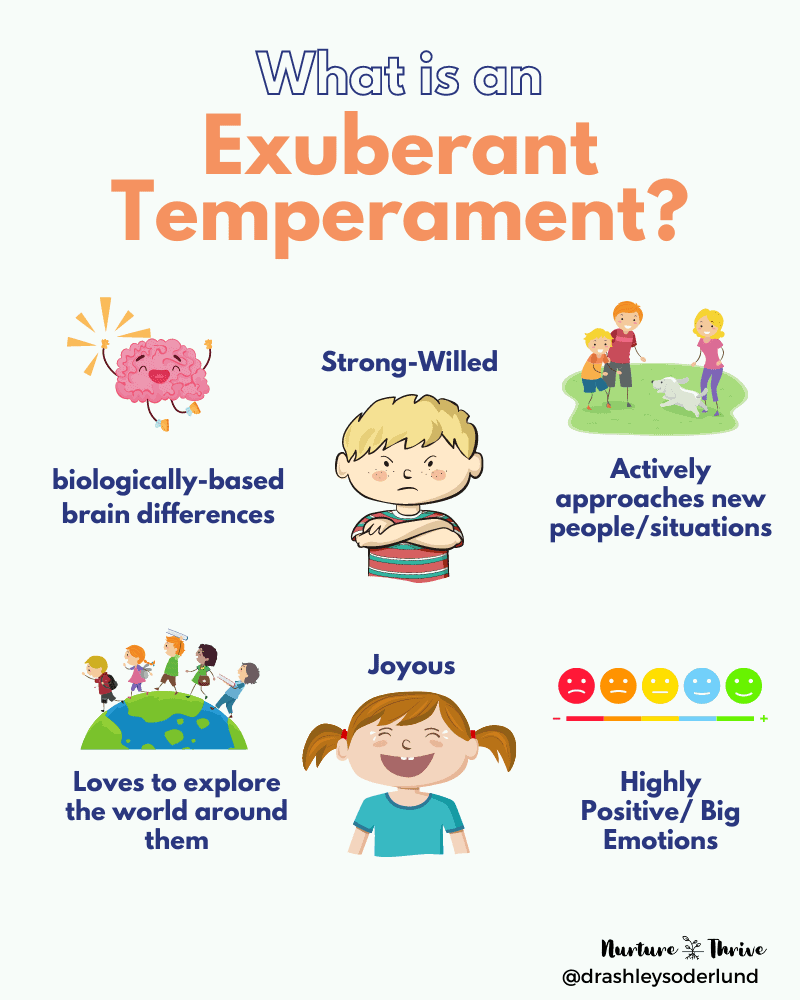Is your child strong-willed or highly spirited? Do they play harder, go further, or demand more? If so, it could be that your child has what child psychologists are calling an exuberant temperament.
Understanding your child’s temperament — the biological foundation for their personality — can help you know how to parent them, bolster their strengths, and reduce the power struggles that seem to accompany strong-willed children.

- Understanding Your Strong-Willed Child
- Four Tips for Parenting a Strong-Willed Child
Understanding Your Strong-Willed Child
When my son was about 3-years old, I started to worry that maybe I was a helicopter mom. I knew that I hovered too much and I struggled to step back and let him just go.
What I didn’t know at the time was that I was faced with the task of parenting a very strong-minded and strong-willed child.
I noticed other parents talking and laughing while glancing at their cautious little ones who were ever-so-carefully negotiating each step up to the slide at the playground.
This was in stark contrast to my son, who ran into a playground or any new situation as if he owned it — with pretty much zero wariness or caution. And for me, that called for a more watchful eye and catching him in his practical free-falls.
With time and a little experience, I was able to step back more, give him more space, and let him take more tumbles and falls. So, yes it was partly me. And with time, he became more regulated and even developed some wariness of his own.
Recently, I had dinner with a friend who told me she to worried about being a “helicopter mom” and was also envious of parents who could casually converse at the playground. Her daughter was much like my son, less wary and cautious than other kids.
Defining What it Means to be a Strong-Willed Child
We both described our kids as intense — as highly-spirited — having a strong will or a strong mind.
By intensity, we meant kids who play harder, go higher, get more physical, are more impulsive, and get their feelings hurt more.
Kids who hug their moms super tight and tackle-hug their dads, kids who love hard and deep.
Strong is a good word for these kids. They are strong in mind, in temperament, and in their character. A trait that will serve them well.
A New Kind of Temperament: The Strong-Willed Exuberant Child
In developmental psychology, the raw personality that a child is born with is called temperament.
Temperament is a child’s own natural tendency in how reactive and regulated they are.
Research has shown many different temperament types, but they have largely been divided into two main categories: inhibited and uninhibited (average) approach.
Most kids show some level of wariness in new situations. They may cautiously explore a new toy or slowly approach a stranger. This is what an “average” approach temperament would look like.
Most of the research has focused on children with an inhibited temperament, those children who are ultra-cautious and tend to back away from or resist new situations. These children may be more likely to be socially anxious.
But recently, developmental psychologists have identified a third type of temperament, the strong-willed temperament or exuberant temperament.
“The exuberant person, far from simply responding to the environment in which he finds himself, acts vigorously upon it or seeks out new ones.”
Kay Redfield Jamison, Exuberance: The Passion for Life (p. 99)
Thus, these sets of traits are rooted in a child’s temperament. The personality traits an exuberant child has can be amazing strengths and serve them well in the future. But, they will need a lot of gentle guidance to get there.
Four Tips for Parenting a Strong-Willed Child
1. Understand That Your Strong-Willed Child is Built This Way
A child’s The first step to understanding your exuberant child is realizing this is their temperament, it is simply how they are built.
Kate Degnan, Ph.D., describes exuberant children as:
- Joyous with even small pursuits and goal attainment
- Actively approaches new things and people
- Explores the world around them and seem to genuinely enjoy this exploration
They are highly positive, social, and ready to embrace new things (1).
I remember when my son was three we had to teach him that he couldn’t just go sit with anyone in a restaurant. He felt no hesitation to go up, say hello, sit down and start talking to a boy his age at another table. That sociability was not something we taught him. It is just how he is built.
Your Child’s Temperament: The Biological Roots of being Strong-Willed
In looking at how readily infants approach new situations, researchers have found different brain reactivity in exuberant kids who tend to approach new things optimistically compared to infants who are more inhibited and tend to avoid new things (2).
In fact, the tendency to approach and to be exuberant is associated with activity in the left frontal lobe of the brain, whereas, being inhibited and wary of new situations/people is associated with activity in the right frontal lobe of the brain (1).
This different kind of reactivity is not bad, but it can lead to more dysregulation in the form of temper tantrums, big feelings, and big behaviors.
Your child is exuberant, strong-willed, and strong-minded because they are built that way. They won’t act like other children because their brain works differently. Knowing this will change your expectations of them and how you parent them.

2. See Your Strong-Willed Child’s Strengths and Joy!
We have a tendency to only focus on the stubbornness, intensity, and willfulness that seems to come along with exuberance, but there are many positive traits about the exuberant child.
These are joyful children! Impulsive yes, but also enthusiastic, entertaining, and joyous!
Many of our expectations and beliefs are held in our labels. We might think of our highly-spirited and exuberant child as demanding, stubborn, defiant, and single-minded. Let’s shift from a shame and blame perspective of a strong-willed child’s behavior to a empower and understand perspective. How do you do that? You start simply by changing the labels.
Instead of ______ let’s call it ______:
Demanding ……Leadership Skills
Stubbornness…..Persistence
Defiance….Independence
Single-Mindedness….Focused Attention
For more on this, I highly recommend Raising Your Spirited Child by Mary Kurcinka, Ed.D (aff link). In her book, she goes through labels and stereotypes (in fact she is credited with coining the phrase the spirited child, which is more positive than “difficult” or “intense”).
The truth is that many of the traits of a highly-spirited child will serve them well in the future. When they are young and self-regulation is not fully developed, these skills will be clumsy, intense, and sometimes very frustrating to parents. But it is exactly during those early childhood years that they will need us most.

3. Be Gentle and Playful With Your Strong-Willed Child
Research shows that children with exuberance will also develop high self-regulation when their mothers are rated as high in gentle discipline and responsiveness.
In one study, children with higher exuberance also showed more behavior problems in school. However, if those children also had a mother who was highly responsive, the link to behavior problems disappeared.
Gentle discipline, in this case, was trying to get their child to move away from the toys and back on task by using “polite suggestions, hints, and playful comments” (Degnan, 2015).
How we parent matters. The parent-child relationship has a lot of impact on strong-willed children.
One way to do this is to use games and fun activities to practice regulation. The one thing exuberant children don’t lack is the willingness to participate and join in.
For example, when you need them to cooperate to get out the door, make it a game. Your exuberant child will literally jump at the opportunity to “put on his frog shoes and jump to the car.”
Harness their playful nature by being playful yourself.
For more about positive parenting and gentle discipline, read this.
Ways to be a Playful and Positive Parent To Your Strong-Willed Child
- Resisting Daily Tasks and Transitions(I don’t want to brush my teeth!):
- If your younger strong-willed toddler is resisting daily tasks, use a listening helper — a small toy who asks your child to brush their teeth instead of you! This makes getting ready for bed a playful time and one where your child can “show” their toy everything they know how to do — like brushing their teeth.
- If your older strong-willed child is resisting daily tasks and transitions, empower them by letting them create a schedule and routine. Put the completed schedule up on the wall, and encourage independence and mastery– the two things strong-willed children want more than anything.
- Angry Outbursts and Frustration: Honor and acknowledge your strong-willed child’s feelings and impulses while also setting limits on their behavior: “It’s okay to be angry, but it isn’t okay to hit.”
- Arguing About Rules: Have two non-negotiable rules — respect and safety. Most important rules fall under these two categories, making rules and arguing about rules easier. Explain to your child that respect and safety rules are non-negotiable and that there are good reasons for this. For example, you could say something like this: “We have screen-time rules to keep your growing brain safe. Too much screen time can have bad effects on your brain. I love and care about you and want you to be safe.” Focus on connection rather than correction. Respect is about connecting and positive relationships. Safety is about just that — keeping your child safe because you care about them!
- Refusal or demanding: Children learn from doing; this is especially true for strong-willed children. Maybe your child needs to leave their jacket at home one day to decide for themselves that they want their jacket. If it isn’t a respect or safety rule, allow for them to make a compromise or learn from their own experiences and choices.
- Playful Alternatives to Punishments: When your child is being bossy, rude, or demanding — instead of withdrawing privileges or punishing, ask for a do-over. Do-overs can work in so many situations. When your child is being bossy, rude, or demanding — instead of withdrawing privileges or punishing, ask for a do-over. Do-overs can work in so many situations. “Whoa!!! This is not the fun we had planned for today! This is not fun for anyone. That was not the way to handle that situation, was it? She didn’t mean to hit you in the eye with her coat sleeve and you know it’s not okay to hit ever. Let’s have a do-over!! Let’s try it all again!! How can we do it better this time?” Keep the focus on connection (let’s all do better and all have fun) and playfulness.
Being playful in your parenting will get you far with any child, but I think it works especially well with the exuberant child.
4. Teach Your Strong-Willed Child Self-Regulation
Along with this joyous and unwary approach to life comes an impulsive side.
Exuberant children have been found to be more at risk for developing more disruptive behavior (2), more risk-taking behaviors in childhood (3), ADHD (4), and more risk-taking behaviors (sex, drugs, alcohol) in their teen years(5).
This does not paint an optimistic picture. The good news is that researchers have found that the reason behind these potential outcomes is not necessarily exuberance itself, but rather the combination of being exuberant and having poor regulation skills.
If an exuberant child is able to develop good regulation and self-discipline, those regulatory skills will protect against some of these outcomes.
So, the big limitation to focus on here is self-regulation. Being exuberant tends to go hand in hand with having impulsivity and self-regulation issues.
WHY?
Well, it probably gets back to their temperament. A careful and wary child naturally has more time to think about how they will approach a situation and how they will react. The exuberant child jumps in without thinking.
They need to learn to stop and think.
They need to learn not only how to regulate negative emotions, like frustration, but also how to regulate excitement and positivity.
The GOOD NEWS: While exuberance itself may not change much, regulation can and will. As parents of exuberant children, we must consciously focus on teaching our children strategies to help them regulate.
Tools for Teaching Strong-Willed Child Regulation Strategies
Printable Tool: My anger management workbook includes 8 self-reflective exercises for kids to do with their parents, Mad-Power is a Super-Power word art mini-poster, and 7 healthy venting exercises for kids. Perfect to add to your child’s calm-down corner or time-in kit. Get your printable copy today!
Game List: Best Games to Teach Kids Self-Regulation an Age-by-Age Guide
What to do next…
1. Get advice from Dr. Ashley Soderlund sent right to your inbox. ❤︎
2. Emotional and mental wellness begins at home.
Get the tools you need in my shop! Digital printables you can instantly download and print to foster connection, emotion regulation, and more! Check out the Nurture and Thrive Shop.

More Resources:
The Playful Way to Get Your Child to Listen and Cooperate (e.g. get out the door faster & with less stress!)
The Playful Strategy That Will Help Your Spirited Child Calm Down (e.g. teaching your exuberant child to stop and think)
Toddler Defiance and the Brain: They Know Better, But Can They Do Better?
Teach Your Child to How to Regulate their Anger in a Healthy Way
Parenting a Strong-Willed Child: How to do it right
The Strong Willed Child: 8 Do’s and Don’ts for Parents to Live By

 7 Ways to Turn Power-Struggles and Over-Excitement into Cooperation and Joy
7 Ways to Turn Power-Struggles and Over-Excitement into Cooperation and Joy